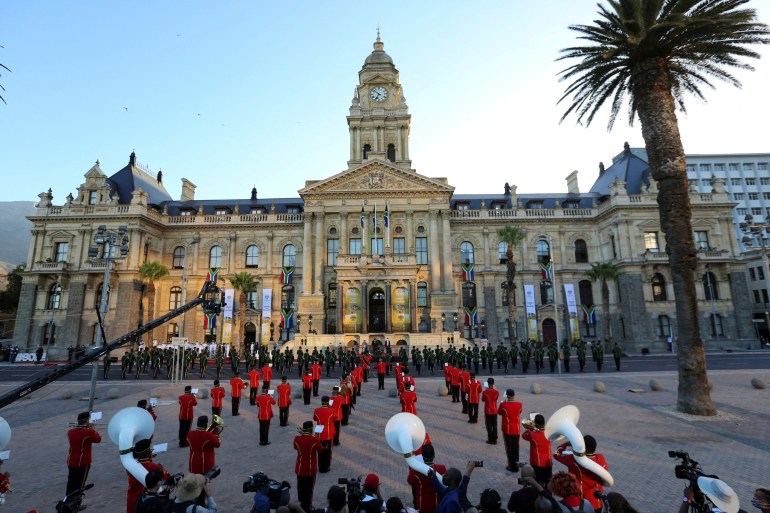Ramaphosa addresses South Africa’s unemployment in nation address
As the country faces one of highest jobless rates globally, South African president pledges ‘to leave no one behind’.

Cape Town, South Africa – President Cyril Ramaphosa has pledged “to leave no one behind” in addressing the country’s high unemployment rate in his sixth State of the Nation Address.
The yearly speech took place on Thursday at Cape Town City Hall, instead of the usual location of Parliament, for the first time in its history.
Keep reading
list of 4 itemsLooming Fed rate hikes have emerging markets dreading deja vu
South Africa cricket coach Boucher charged over racism allegation
Africa CDC chief calls for COVID vaccines with longer shelf life
The venue changed after a fire on January 2 gutted the Parliament building, causing the roof of the New Wing housing the lower chamber National Assembly to collapse. A 49-year-old man has been charged in connection with the fire.
Africa’s most industrialised nation has one of the highest unemployment rates in the world. As of the third quarter of 2021, the latest data available, it had a 34.9 percent unemployment rate.
In his speech, Ramaphosa acknowledged the country needed “fundamental change and reforms” to revive its economic growth.
“COVID-19 has exacerbated the divide between those who are employed and those who are unemployed. Last year our unemployment rate reached its highest recorded level,” he said.
The president said the problems with the South African economy were both “deep” and “structural”.
“Where electricity supply cannot be guaranteed, when our railways and ports are inefficient, when innovation is held back by a scarcity of broadband spectrum, water quality deteriorates in our municipalities and where we live. Companies are reluctant to invest and the economy cannot function properly.”

To address this, the African National Congress (ANC) leader promised “far-reaching structural reforms” that will modernise industries to unlock investment, grow the economy and create jobs.
“We know, however, that even with the best business environment and much faster rates of economic growth, it will take time for the private sector to create enough jobs for the millions of South Africans who need them. Our intent is to leave no one behind,” he said.
He pledged to create better livelihoods by prioritising infrastructure projects in energy, roads and water management.
Ramaphosa also said South Africa’s transition into a green economy would create jobs in mining minerals that help provide clean energy, as well as green hydrogen, solar and wind.
The country’s global business services sector is on track to create 500,000 new jobs over the next few years, Ramaphosa added.
He also touted the country’s growing hemp and cannabis sector, which he said could create more than 130,000 new jobs.
The wide-ranging speech that lasted nearly two hours saw the president addressing areas from gender-based violence to state corruption. A shadow hanging over the ANC is the State Capture inquiry into corruption and fraud in the public sector, including in former president Jacob Zuma’s government.

The Zondo Commission was launched in 2018 to look into the allegations, and the inquiry published the first two out of three reports into the scandal in January and February.
“While the definitive conclusion has yet to be delivered and will be at the end of this month, the first two parts of the report make it plain that there was indeed state capture. This means that public institutions and state-owned enterprises were infiltrated by a criminal network intent on looting public money for private gain,” Ramaphosa said.
“We must now do everything in our power to ensure it never happens again,” he added.
Ramaphosa said he would present a plan of action by June to respond to the commission’s recommendations and he pledged to bring the criminals involved to justice.
South Africa saw its economy ravaged by deadly riots last year that swept across Gauteng and the eastern province of KwaZulu-Natal, causing more than 25 billion rand ($1.7bn) worth of damage and killing 337 South Africans. Some private security companies were found to be involved in the unrest.
Ramaphosa said he would be making several leadership changes in a number of security agencies to strengthen the country’s security structures and take heed of the recent report into the riots, which concluded there was poor coordination between the state security and intelligence services.
‘Very significant shift’
South African political analyst Daniel Silke told Al Jazeera in his speech Ramaphosa identified core areas in business and governance “that require attention”, but whether they can be implemented is another question.
“The big hope certainly from an economic point of view this year is that the government does open its doors a lot more to the private sector,” he said.
“Now what was emphasised in the first part of the speech was this very issue and in fact, Ramaphosa emphasised correctly – that now is the time ultimately for the private [sector] to drive job creation.”
Silke said the speech marked “a very significant shift” from the ANC’s previous stance, because it acknowledged the party’s “failure of the state-centred approach to business” and was more welcoming of the private sector.
Bianca Chigbu, a lecturer and economic sociologist at the University of Fort Hare, was more sceptical.
“As Ramaphosa said, businesses create jobs but we know that such businesses prefer cheap labour and, therefore, will employ immigrants due to their willingness to accept lower wages. Their idea of leaving the responsibility of job creation in the hands of businesses will be futile and the locals will be disadvantaged,” Chigbu told Al Jazeera.